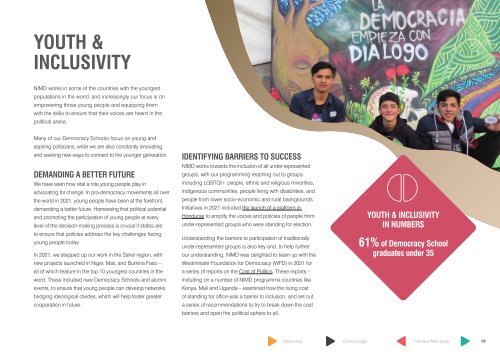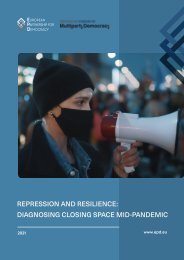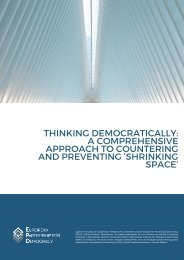NIMD Annual Report 2021
You also want an ePaper? Increase the reach of your titles
YUMPU automatically turns print PDFs into web optimized ePapers that Google loves.
<strong>NIMD</strong> <strong>Annual</strong> <strong>Report</strong> 2018<br />
YOUTH &<br />
INCLUSIVITY<br />
<strong>NIMD</strong> works in some of the countries with the youngest<br />
populations in the world, and increasingly our focus is on<br />
empowering those young people and equipping them<br />
with the skills to ensure that their voices are heard in the<br />
political arena.<br />
Many of our Democracy Schools focus on young and<br />
aspiring politicians, while we are also constantly innovating<br />
and seeking new ways to connect to the younger generation.<br />
DEMANDING A BETTER FUTURE<br />
We have seen how vital a role young people play in<br />
advocating for change. In pro-democracy movements all over<br />
the world in <strong>2021</strong>, young people have been at the forefront,<br />
demanding a better future. Harnessing that political potential<br />
and promoting the participation of young people at every<br />
level of the decision-making process is crucial if states are<br />
to ensure that policies address the key challenges facing<br />
young people today.<br />
In <strong>2021</strong>, we stepped up our work in the Sahel region, with<br />
new projects launched in Niger, Mali, and Burkina Faso –<br />
all of which feature in the top 10 youngest countries in the<br />
word. These included new Democracy Schools and alumni<br />
events, to ensure that young people can develop networks<br />
bridging ideological divides, which will help foster greater<br />
cooperation in future.<br />
IDENTIFYING BARRIERS TO SUCCESS<br />
<strong>NIMD</strong> works towards the inclusion of all under-represented<br />
groups, with our programming reaching out to groups<br />
including LGBTQI+ people, ethnic and religious minorities,<br />
indigenous communities, people living with disabilities, and<br />
people from lower socio-economic and rural backgrounds.<br />
Initiatives in <strong>2021</strong> included the launch of a platform in<br />
Honduras to amplify the voices and policies of people from<br />
under-represented groups who were standing for election.<br />
Understanding the barriers to participation of traditionally<br />
under-represented groups is also key and, to help further<br />
our understanding, <strong>NIMD</strong> was delighted to team up with the<br />
Westminster Foundation for Democracy (WFD) in <strong>2021</strong> for<br />
a series of reports on the Cost of Politics. These reports –<br />
including on a number of <strong>NIMD</strong> programme countries like<br />
Kenya, Mali and Uganda – examined how the rising cost<br />
of standing for office was a barrier to inclusion, and set out<br />
a series of recommendations to try to break down the cost<br />
barriers and open the political sphere to all.<br />
YOUTH & INCLUSIVITY<br />
IN NUMBERS<br />
61% of Democracy School<br />
graduates under 35<br />
World map<br />
Content page<br />
Previous/Next page<br />
16

















